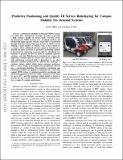| dc.contributor.author | Miller, Justin Lee | |
| dc.contributor.author | How, Jonathan P | |
| dc.date.accessioned | 2018-04-13T19:18:03Z | |
| dc.date.available | 2018-04-13T19:18:03Z | |
| dc.date.issued | 2017-07 | |
| dc.identifier.isbn | 978-1-5090-4633-1 | |
| dc.identifier.issn | 978-1-5090-4634-8 | |
| dc.identifier.uri | http://hdl.handle.net/1721.1/114725 | |
| dc.description.abstract | Autonomous Mobility On Demand (MOD) systems can utilize fleet management strategies in order to provide a high customer quality of service (QoS). Previous works on autonomous MOD systems have developed methods for rebalancing single capacity vehicles, where QoS is maintained through large fleet sizing. This work focuses on MOD systems utilizing a small number of vehicles, such as those found on a campus, where additional vehicles cannot be introduced as demand for rides increases. A predictive positioning method is presented for improving customer QoS by identifying key locations to position the fleet in order to minimize expected customer wait time. Ridesharing is introduced as a means for improving customer QoS as arrival rates increase. However, with ridesharing perceived QoS is dependent on an often unknown customer preference. To address this challenge, a customer ratings model, which learns customer preference from a 5-star rating, is developed and incorporated directly into a ridesharing algorithm. The predictive positioning and ridesharing methods are applied to simulation of a real-world campus MOD system. A combined predictive positioning and ridesharing approach is shown to reduce customer service times by up to 29%. and the customer ratings model is shown to provide the best overall MOD fleet management performance over a range of customer preferences. | en_US |
| dc.description.sponsorship | Ford Motor Company | en_US |
| dc.description.sponsorship | Ford-MIT Alliance | en_US |
| dc.publisher | Institute of Electrical and Electronics Engineers (IEEE) | en_US |
| dc.relation.isversionof | http://dx.doi.org/10.1109/ICRA.2017.7989167 | en_US |
| dc.rights | Creative Commons Attribution-Noncommercial-Share Alike | en_US |
| dc.rights.uri | http://creativecommons.org/licenses/by-nc-sa/4.0/ | en_US |
| dc.source | arXiv | en_US |
| dc.title | Predictive positioning and quality of service ridesharing for campus mobility on demand systems | en_US |
| dc.type | Article | en_US |
| dc.identifier.citation | Miller, Justin, and Jonathan P. How. “Predictive Positioning and Quality of Service Ridesharing for Campus Mobility on Demand Systems.” 2017 IEEE International Conference on Robotics and Automation (ICRA), May 2017, Singapore, Singapore, 2017. | en_US |
| dc.contributor.department | Massachusetts Institute of Technology. Laboratory for Information and Decision Systems | |
| dc.contributor.mitauthor | Miller, Justin Lee | |
| dc.contributor.mitauthor | How, Jonathan P | |
| dc.relation.journal | 2017 IEEE International Conference on Robotics and Automation (ICRA) | en_US |
| dc.eprint.version | Original manuscript | en_US |
| dc.type.uri | http://purl.org/eprint/type/ConferencePaper | en_US |
| eprint.status | http://purl.org/eprint/status/NonPeerReviewed | en_US |
| dc.date.updated | 2018-03-21T16:40:11Z | |
| dspace.orderedauthors | Miller, Justin; How, Jonathan P. | en_US |
| dspace.embargo.terms | N | en_US |
| dc.identifier.orcid | https://orcid.org/0000-0002-4621-2960 | |
| dc.identifier.orcid | https://orcid.org/0000-0001-8576-1930 | |
| mit.license | OPEN_ACCESS_POLICY | en_US |
